8+ Sample Waste Management Business Plan
-
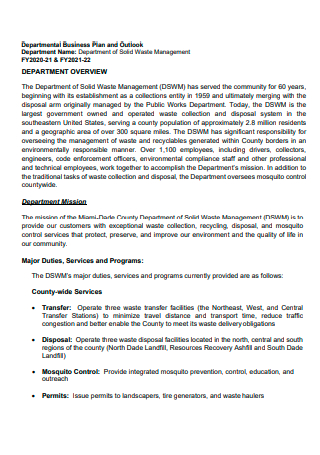
Department of Solid Waste Management Business Plan
download now -
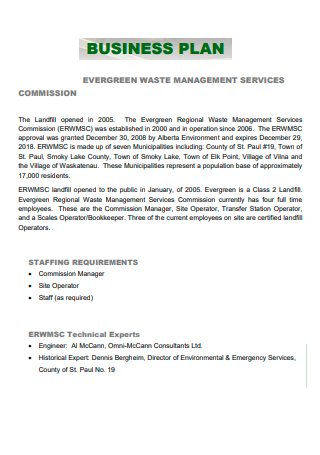
Waste Management Services Commission Business Plan
download now -
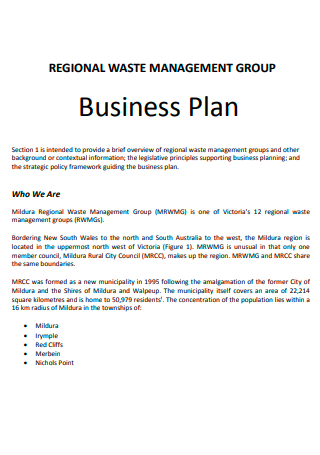
Regional Waste Management Group Business Plan
download now -
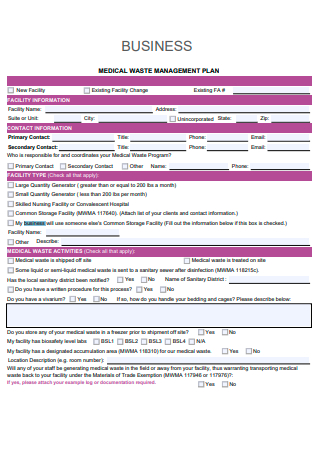
Meical Waste Management Business Plan
download now -
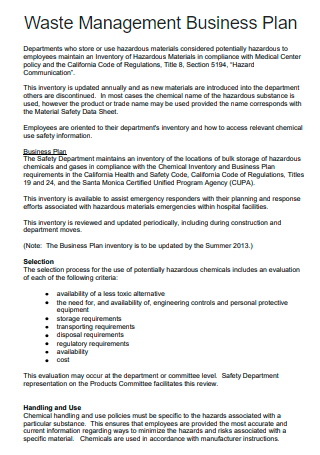
Waste Management Business Plan Example
download now -
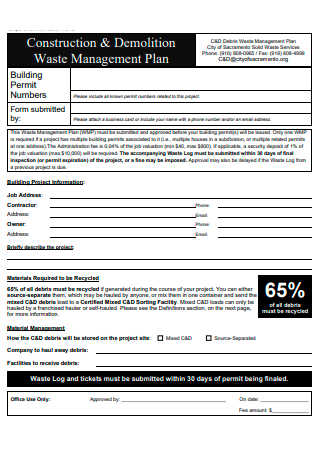
Printable Waste Management Business Plan
download now -
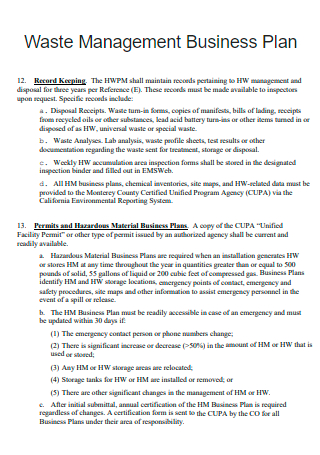
Simple Waste Management Business Plan
download now -
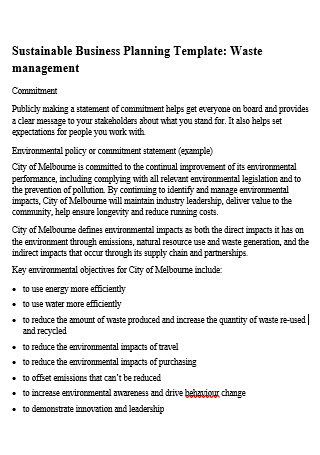
Waste Management Sustainable Business Planning
download now -
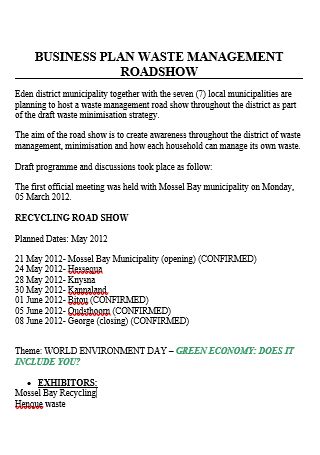
Waste Management Business Plan in DOC
download now
FREE Waste Management Business Plan s to Download
8+ Sample Waste Management Business Plan
What Is a Waste Management Business Plan?
Types of Waste Management Disposal
Benefits of Waste Management
Tips When Making a Waste Management Business Plan
FAQS
Why Is a Waste Management Business Plan Vital?
Is the Waste Management Industry Lucrative?
Is it Possible to Start My Own Waste Management Company?
What Is a Waste Management Business Plan?
A waste management business plan is a thorough document that covers the services provided by a waste management company. It might range from permanent disposal to garbage transfer. The business proposal also includes a list of permits that must be obtained before operations can begin. Furthermore, it describes the company’s goals and objectives. It provides a brief overview of the company and its operations. The plan specifies the jobs that would be required to complete the operation. The waste management business proposal could also include information on the method of disposal that will be used. In addition to the type of waste they would accept and how their system would work. This includes where they intend to dispose of their waste and the locations, they intend to cover with garbage pickup.
The waste management industry is not regarded as a profitable venture. However, it is considered essential for both regulation and control of garbage that is haphazardly dumped into the environment. According to epa.gov data, as of 2018, approximately 146.1 million tons of Municipal Solid Waste were landfilled. So that makes controlling proper waste disposal a necessary element. Despite the fact that some of these methods continue to have adverse effects.
Types of Waste Management Disposal
Despite academic research statement and advances in scientific technology, we have yet to discover a completely safe technique to permanently dispose of waste. That would suggest that it would cause no harm to the environment during disposal. However, we have devised strategies to limit the damage to everything that could be touched by it. This applies to both the environment and people. Right now, the ideal circumstance is receiving good health reports from its surroundings. As a result, our ingenuity and approach evolved to deal with this issue more effectively. And the list below may be useful for your business’s waste management plan.
Benefits of Waste Management
There are numerous research reports that will teach you about the advantages of having a systematic waste management plan. Some of these approaches can be applied in your daily life. And, in order to protect ourselves and our world, we must learn how to properly dispose of our garbage. Perhaps small but never a useless attempt. All of our small effort ll of these all of ours will add up over time and have their own influence. We may all learn to assist in minor things. The world will make it big for us. It also provides advantages for businesses.
Tips When Making a Waste Management Business Plan
A waste management plan, whether for a business or not, should be thorough. One of its goals is to address the principal waste issue in a certain location. And here are some suggestions to consider while creating a waste management business plan.
-
1. Set Objectives and Goals
The business plan must have its own set of objectives in order to function properly. Its goal can be based on how it intends to operate or the amount of garbage it intends to dispose of in a given time frame. These goals might assist in introducing the company responsible for trash management. Additionally, these goals should concentrate on how to operate efficiently. Declaring goals and objectives facilitates the process.
-
2. Check for Permits
Building and land permits, in addition to business permits, are particularly needed for waste management. This is due to the fact that disposals may be harmful to the surrounding. As a result, it is advised that it is located far away from nearby residents. Not only that, but environmental standards must also be followed. It is critical to keep track of waste management.
-
3. Select a Type of Waste Management Disposal
There are just a handful and strictly controlled types of common waste disposal. This might include everything from landfills to incineration. It is critical to select a type of disposal. This is since obtaining a permit in a specific location may be difficult. Alternatively, like landfills, it may necessitate a large plot of land. And consultation with local governments and environmentalists. What kind of garbage would be accepted would also be determined by the type of waste management disposal.
-
4. Create a Waste Management System
The waste management system includes garbage collection, sorting, and disposal. For a smoother function, these three processes must be performed concurrently and harmoniously. It should go through when, how, and where the waste will be collected. Or the route that garbage trucks would take. And the process of separating what is acceptable in a particular disposal facility. And how they will be disposed of, as well as where the rejected waste will be disposed of.
-
5. Create a Waste Management Business Plan
Everything mentioned above, from methods to approaches to goals, should be documented and discussed in the business proposal. It should be thorough and informative. In addition to providing critical facts such as criteria, process, and goal.
FAQS
Why Is a Waste Management Business Plan Vital?
A waste management business plan is essential because it specifies the intricacies required in waste management. This includes the method, the system used, the services provided, and the estimated costs. Not only that, but obtaining a permit assures that everything is done legally. And everything is in accordance with the rules.
Is the Waste Management Industry Lucrative?
This is entirely dependent on the type of waste management system you use. Electricity generated by incineration might be used to power a city. As a result, there is a profit. Even recycling centers profit from the sale of recycled products.
Is it Possible to Start My Own Waste Management Company?
Without a doubt! Simply research the type of waste management you prefer. Then, get all of the essential permits and requirements. Although it may be pricey, as it usually necessitates a huge area of land. Obey the regulations to ensure a smoother operation!
Life is not a waste! Thus, we must learn to value things that have the potential to protect and preserve it. This includes caring for our environment and planet. And what could be more beneficial to that mission than developing our own waste and recycling management business plan? Get it now!
